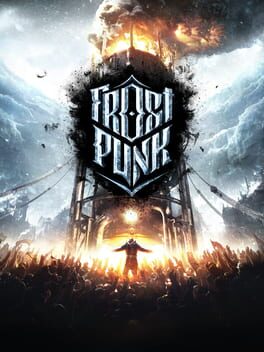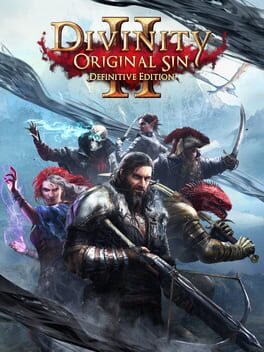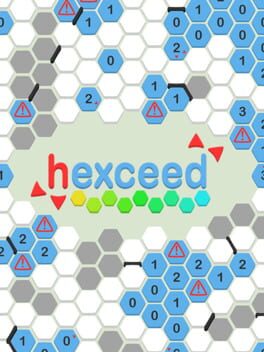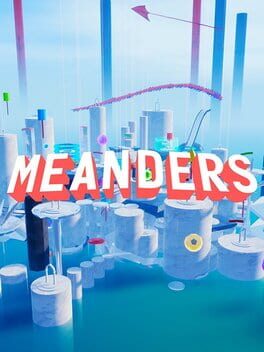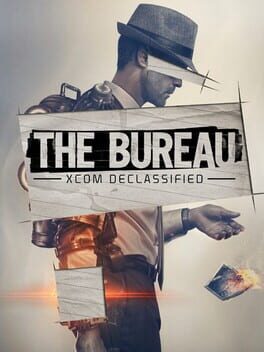OnlineSammie
2018
This game has a really cool setting. It's a city builder with a heat management aspect, so you have to make sure your citizens (survivors) don't freeze to death in their homes or at work. It's a really cool idea and aesthetic, the problem is the game is super linear. Expect to chuck your first game up to a learning experience and losing that one, as is usual with city builders in my experience. But the game is too linear and easy so the second one is probably going to be a success, and once you've done it there's nothing else to play for. There are events in the game, sure, but they are either predetermined or I got very unlucky in getting the exact same events in the same order. I hope the sequel can do better in this regard, as this is really fun the first time through, it just doesn't have the usual aspect of replayability I expect from a city builder.
2013
This... is not a game. I don't mean that because it's a walking simulators. There are absolutely games in that genre. I mean that because there's absolutely no progression. The basic gameplay consists of walking through a forest on an island. If you play for long enough, you may find a trigger to change the season, after which you wake up on the same island in autumn. Do it again and wake up on the same island in winter. See the pattern now? There's no end to the game, there's just the four seasons that change when you trigger them.
2019
The reason to get a VR headset. It's got a good mix of music with even more added via DLC, and it serves as an okay workout depending on the song, too. It's a very fine game but not a 5* in and of itself. Except it has mods. Oh lord it has so many mods that make the experience so much better. All the songs you can imagine have been ported in by the community, and you can get them via an in-game or out-of-game browser. This absolutely kicks ass.
The story is pretty dogshit, but the gameplay is the best of any CRPG I've ever played. Each encounter feels meaningful and dangerous. There's enough choices that each game can feel meaningfully different, and to boot it's got 4-player co-op for fun with friends. There are only two problems with this game as far as I can see; the story as mentioned before is outright bad, and so is the writing, and the power curve is a bit off, meaning you feel very underpowered in the beginning and overpowered by the end, but I suppose that choice makes sense in the context of the story, which I won't spoil here. But that's just an excuse for a game that feels very imbalanced both early- and late game. I played through this a few times, both in co-op and alone and the difficulty always felt like this, so it's not a problem of the friendly AI not being up to par, it's just the encounter design.
2021
This game is the epitome of quantity over quality. There are more than 2000 levels in this game, but most of them are mindless and easy if you've ever played a game like this before (see Hexcells for a more refined version of this). The game itself is free-to-play with level packs available for a small fee individually or with a season pass to unlock them all. Each level pack introduced also updated the Tutorial Isle with a set of levels to explain the mechanics in detail, so if you really want to experience the essence of this game without all the fluff, play through the entirety of the Tutorial Isle, and if you feel like one mechanic is particularly interesting to you, get that one level pack. I just can't recommend playing through the entirety of this because it gets so mindless so quickly. The levels are handcrafted but they feel as though they aren't. Alternatively to the approach I offered before, get Hexcells Infinite if you want to support the original creator of this concept of puzzle game (even though it's derivative of Minesweeper). It has better levels and an infinite level creator with seed inputs if you want to compete against friends for some reason. As it stands I just can't recommend this fatty puzzle game. If the levels were more intricately deisgned or harder, I could see the appeal, but now it's all just noise with very little signal.
2018
This review contains spoilers
Meanders is a somewhat decent indie game. You platform around trying to shoot balls through hoops or balloons or whatever else the level decides, and then when you're done you move onto the next. Nothing special. At least on the surface, because after you complete the game, you get to add a rule. I'm not talking about stuff like an extra jump. I'm talking about porting the basic mechanics from a whole other game like Space Engineers or Serious Sam into this game and playing through the whole thing again like that. It is honestly insane to think that this game brought together other indie titles like never before and implemented them in a somewhat faithful way, with level design to facilitate it. For example, my first choice of added rules was No Meander's Sky, an obvious play on No Man's Sky in it's somewhat original form, so instead of holding a ball you get a gun with 5 shots, and instead of a double jump I got a jetpack.
I really don't have much more to say about this game than that, the mechanics are fine and the level design is adequate if simple. There's a fun little bit of personality to it where the text on the screen keeps putting you down for being slow. And the game does have a level select and a speedrun mode if you're into that sort of thing, but I'm really not. The music mixes between not really noticeable and kinda funky, but again it's nothing super special. There is one thing that bugs me, and that is that there seems to be absolutely zero movement tech in the game, which is a damn shame. In fact, it seems they purposefully limited the speed at which you can go, because any bounces that create speed is immediately capped by your jetpack. As I said before, the game itself is mediocre when you get down to it, but what it does with implementing other games' mechanics into it is really special, and I hope to see more games do the same in the future.
I really don't have much more to say about this game than that, the mechanics are fine and the level design is adequate if simple. There's a fun little bit of personality to it where the text on the screen keeps putting you down for being slow. And the game does have a level select and a speedrun mode if you're into that sort of thing, but I'm really not. The music mixes between not really noticeable and kinda funky, but again it's nothing super special. There is one thing that bugs me, and that is that there seems to be absolutely zero movement tech in the game, which is a damn shame. In fact, it seems they purposefully limited the speed at which you can go, because any bounces that create speed is immediately capped by your jetpack. As I said before, the game itself is mediocre when you get down to it, but what it does with implementing other games' mechanics into it is really special, and I hope to see more games do the same in the future.
2019
This review contains spoilers
I played enough of this to where I feel I can write a review, but I did not complete the game and I have no intention to. This is because it's really, really scary. Like way scarier than it has any right to be, specifically the water planet and Dark Bramble. That's the only reason I dock it some points is because I just could not get through that block.
The game itself aside from that is great, there's lots of good puzzles in what I've played, getting around the universe itself is a giant puzzle, and I appreciate a game that does something more than the usual with its movement. The spacecraft you fly is surprisingly easy and quick to learn, and you're never really required to maneuver it amazingly. This is also a game that requires that you think outside the box a lot, which got me stuck sometimes as I am set in my game-y ways.
Overall it's a great game that is only docked for being too scary to allow me to finish it. Maybe one day. With the windows open. At full daylight. And no sound.
The game itself aside from that is great, there's lots of good puzzles in what I've played, getting around the universe itself is a giant puzzle, and I appreciate a game that does something more than the usual with its movement. The spacecraft you fly is surprisingly easy and quick to learn, and you're never really required to maneuver it amazingly. This is also a game that requires that you think outside the box a lot, which got me stuck sometimes as I am set in my game-y ways.
Overall it's a great game that is only docked for being too scary to allow me to finish it. Maybe one day. With the windows open. At full daylight. And no sound.
This review contains spoilers
The Bureau: XCOM Declassified
I started out hating this game. Not only did it seem like a more shallow version of the already-lackluster Mass Effect 2 combat from 2010, the story was nothing to write home about either. And yet I did write about it, so what changed? Well first of all, I have to acknowledge that the aesthetic is very well done. In terms of fidelity the game isn't amazing, but it has a very cohesive retro-futuristic look mixed with a weird XCOM 2 alien structure design, and it works for some reason. They feel appropriately out of place next to each other, like you have been invaded by a technologically superior race. Bravo. Second of all, and this is where it gets good, at some point after the halfway point I realized that this aesthetic of a 50s sci fi B movie was not just surface level. Rather it translated into the writing, the acting, and the story itself. Now obviously I can't know if this was intentional or not, but it certainly feels exactly like the corny stuff you'd expect from those productions. Certainly the art assets are made this way intentionally, and it would take really, really awful writers to come up with the stuff unintentionally, so my gut feeling is that it was on purpose. And while that may not make for a great game, it makes for a great concept for one.
Let's talk about the story for a minute. It starts off very predictably with the standard tropes of an in medias res by way of an alien attack on the government facility where you work as Special Agent William Carter. He literally looks like the family man you'd see in a Fallout poster which itself parodies 50s American propaganda. And the story itself follows suit; it is a clear allegory for a Cold War for a long while. The aliens are the Soviets, complete with infiltrators, sleeper agents, and a hivemind with no room for individuality. The main characters are, of course, the main characters; Americans who patriotically and heroically sacrifice their own lives for the country, and by God they look good doing it! Only, in the background and left unsaid for much of it is a more sinister undertone. For example, on the main base in the campaign there is a shooting range, as is customary in these types of games. At the start of the campaign this is a standard operation, you push a button, the targets line up, and you can shoot their heads or whatever you want. After a few missions, however, when you push that button little grey aliens show up. And then the game becomes not about shooting the stationary targets but about shooting a defenseless creature that, as you later come to know, is actually just a slave to the system, forced to build structures and only shooting at you in self-defense. Furthermore, Carter (the main character) slowly becomes fed up with the system and his (yours) boss, Faulke. Becomes of the way the chain of command works, he doesn't get to know all the information, and that often leaves him in the dark on missions.
All the above is fine and it could certainly make for an interesting experience if developed. But it's not. Instead after like half the game the allegory is dropped, the aliens are no longer Russians, now they're just regular aliens again. And Carter's outspoken dissatisfaction with the system morphs into something else. Throughout the game you find out that the main bad guy, the one that you must kill to turn off all the other aliens (because of course), has a telepathic bond with the entire rest of the alien species and gives them commands that way. When you finally confront him, he calls you Prisoner, as he has done in the past, and tells you that he actually doesn't care about you, he cares about your demon. It turns out that the reason Carter is special and has these abilities to overlook the battlefield in the way that forms the main mechanic of the game, is actually because he has an Ethereal living inside of him. Basically they're telepathic ghosts. Carter then promptly kills the bad guy and seals away the bad guy ghost in his arm (roll with it). They then return to base and lock it away in a giant tube of green gas that they conveniently had lying around. From this point on, Carter hears more and more voices, and he speaks out explicitly against them. This all comes to ahead when, after the base has been attacked for a second time, he faces the camera and speaks directly to you, the player and the ghost. He says he is done being a slave to the system, he has his own free will and he would rather die than be a puppet to someone else. So he gives you an ultimatum; he sets down a bomb and gives you 30 seconds to decide if you want to stay with him and be killed or detach yourself from him and leave the situation alone. The guy you've been controlling the entire time gives you an ultimatum. And you actually do have 30 seconds to decide. Incidentally it's not really a choice because if you choose to stay with him for the entire duration of the countdown, the bomb really does blow up and you get a game over screen. Instead you must detach yourself from him. And then you choose. Throughout the game there have been 3 minor characters; Director Faulke as mentioned before, the scientist Doctor Weir, and a hot female agent named Angela Weaver. Now you must choose one of them to possess, and you thusly play the last mission as that character. Not only that, the character you chose saves you from being assassinated by Carter, and so he is now an anti-hero in the story! You then proceed to go into space and kill the bad guy (again but for real this time I promise), and you have to choose whether to kill Carter or not. On one hand he threatened to kill you multiple times, and he has become a liability to the sytem, on the other you just spent something close to 10 hours playing as the man. This feels a bit like Mass Effect 3's ending choice of reprogramming the machines for your own benefit or destroying the system and breaking free will but at a severe cost to your progress. Except here there is no choice. You made your choice already. You chose to leave Carter, the only person who could've stopped the system, and instead you invested in Weaver, Weir, or Faulke. It doesn't matter who because they're all The System, they're all the same, there is no individuality between them. And so you dutifully step into the chamber from which the enemy army is controlled, and you take over. And then, and here's the good part, you order them to systematically slaughter each other. You don't just genocide the fuck out of them, you force them to genocide the fuck out of each other. Then, even though you EXPLICITLY FOUND A CURE FOR THE BODYSNATCHER DISEASE WHICH THEY INFECTED MILLIONS OF PEOPLE WITH EARLIER IN THE GAME, you genocide anyone who has been "compromised", anyone who was a victim, and you wipe out their towns, their cities, their entire histories. All to preserve the lie that there was no alien invasion. Everything gets redacted, every person who knew about it is either forced to work for XCOM or they're assassinated. And that's why I had to write about it.
I started out hating this game. Not only did it seem like a more shallow version of the already-lackluster Mass Effect 2 combat from 2010, the story was nothing to write home about either. And yet I did write about it, so what changed? Well first of all, I have to acknowledge that the aesthetic is very well done. In terms of fidelity the game isn't amazing, but it has a very cohesive retro-futuristic look mixed with a weird XCOM 2 alien structure design, and it works for some reason. They feel appropriately out of place next to each other, like you have been invaded by a technologically superior race. Bravo. Second of all, and this is where it gets good, at some point after the halfway point I realized that this aesthetic of a 50s sci fi B movie was not just surface level. Rather it translated into the writing, the acting, and the story itself. Now obviously I can't know if this was intentional or not, but it certainly feels exactly like the corny stuff you'd expect from those productions. Certainly the art assets are made this way intentionally, and it would take really, really awful writers to come up with the stuff unintentionally, so my gut feeling is that it was on purpose. And while that may not make for a great game, it makes for a great concept for one.
Let's talk about the story for a minute. It starts off very predictably with the standard tropes of an in medias res by way of an alien attack on the government facility where you work as Special Agent William Carter. He literally looks like the family man you'd see in a Fallout poster which itself parodies 50s American propaganda. And the story itself follows suit; it is a clear allegory for a Cold War for a long while. The aliens are the Soviets, complete with infiltrators, sleeper agents, and a hivemind with no room for individuality. The main characters are, of course, the main characters; Americans who patriotically and heroically sacrifice their own lives for the country, and by God they look good doing it! Only, in the background and left unsaid for much of it is a more sinister undertone. For example, on the main base in the campaign there is a shooting range, as is customary in these types of games. At the start of the campaign this is a standard operation, you push a button, the targets line up, and you can shoot their heads or whatever you want. After a few missions, however, when you push that button little grey aliens show up. And then the game becomes not about shooting the stationary targets but about shooting a defenseless creature that, as you later come to know, is actually just a slave to the system, forced to build structures and only shooting at you in self-defense. Furthermore, Carter (the main character) slowly becomes fed up with the system and his (yours) boss, Faulke. Becomes of the way the chain of command works, he doesn't get to know all the information, and that often leaves him in the dark on missions.
All the above is fine and it could certainly make for an interesting experience if developed. But it's not. Instead after like half the game the allegory is dropped, the aliens are no longer Russians, now they're just regular aliens again. And Carter's outspoken dissatisfaction with the system morphs into something else. Throughout the game you find out that the main bad guy, the one that you must kill to turn off all the other aliens (because of course), has a telepathic bond with the entire rest of the alien species and gives them commands that way. When you finally confront him, he calls you Prisoner, as he has done in the past, and tells you that he actually doesn't care about you, he cares about your demon. It turns out that the reason Carter is special and has these abilities to overlook the battlefield in the way that forms the main mechanic of the game, is actually because he has an Ethereal living inside of him. Basically they're telepathic ghosts. Carter then promptly kills the bad guy and seals away the bad guy ghost in his arm (roll with it). They then return to base and lock it away in a giant tube of green gas that they conveniently had lying around. From this point on, Carter hears more and more voices, and he speaks out explicitly against them. This all comes to ahead when, after the base has been attacked for a second time, he faces the camera and speaks directly to you, the player and the ghost. He says he is done being a slave to the system, he has his own free will and he would rather die than be a puppet to someone else. So he gives you an ultimatum; he sets down a bomb and gives you 30 seconds to decide if you want to stay with him and be killed or detach yourself from him and leave the situation alone. The guy you've been controlling the entire time gives you an ultimatum. And you actually do have 30 seconds to decide. Incidentally it's not really a choice because if you choose to stay with him for the entire duration of the countdown, the bomb really does blow up and you get a game over screen. Instead you must detach yourself from him. And then you choose. Throughout the game there have been 3 minor characters; Director Faulke as mentioned before, the scientist Doctor Weir, and a hot female agent named Angela Weaver. Now you must choose one of them to possess, and you thusly play the last mission as that character. Not only that, the character you chose saves you from being assassinated by Carter, and so he is now an anti-hero in the story! You then proceed to go into space and kill the bad guy (again but for real this time I promise), and you have to choose whether to kill Carter or not. On one hand he threatened to kill you multiple times, and he has become a liability to the sytem, on the other you just spent something close to 10 hours playing as the man. This feels a bit like Mass Effect 3's ending choice of reprogramming the machines for your own benefit or destroying the system and breaking free will but at a severe cost to your progress. Except here there is no choice. You made your choice already. You chose to leave Carter, the only person who could've stopped the system, and instead you invested in Weaver, Weir, or Faulke. It doesn't matter who because they're all The System, they're all the same, there is no individuality between them. And so you dutifully step into the chamber from which the enemy army is controlled, and you take over. And then, and here's the good part, you order them to systematically slaughter each other. You don't just genocide the fuck out of them, you force them to genocide the fuck out of each other. Then, even though you EXPLICITLY FOUND A CURE FOR THE BODYSNATCHER DISEASE WHICH THEY INFECTED MILLIONS OF PEOPLE WITH EARLIER IN THE GAME, you genocide anyone who has been "compromised", anyone who was a victim, and you wipe out their towns, their cities, their entire histories. All to preserve the lie that there was no alien invasion. Everything gets redacted, every person who knew about it is either forced to work for XCOM or they're assassinated. And that's why I had to write about it.
